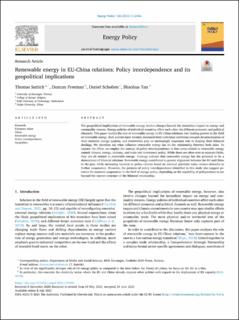| dc.contributor.author | Sattich, Thomas Michael | |
| dc.contributor.author | Freeman, Duncan | |
| dc.contributor.author | Scholten, Daniel | |
| dc.contributor.author | Yan, Shaohua | |
| dc.date.accessioned | 2021-10-18T12:05:54Z | |
| dc.date.available | 2021-10-18T12:05:54Z | |
| dc.date.created | 2021-09-06T16:05:39Z | |
| dc.date.issued | 2021-09 | |
| dc.identifier.citation | Sattich, T., Freeman, D., Scholten, D., Yan, S. Renewable energy in EU-China relations: Policy interdependence and its geopolitical implications, Energy Policy, 156, 112456 | en_US |
| dc.identifier.issn | 0301-4215 | |
| dc.identifier.uri | https://hdl.handle.net/11250/2823691 | |
| dc.description.abstract | The geopolitical implications of renewable energy involve changes beyond the immediate impact on energy and commodity streams. Energy policies of individual countries affect each other via different economic and political channels. This paper studies the role of renewable energy in EU-China relations, two leading powers in the field of renewable energy. Both polities have recently increased their individual ambitions towards decarbonisation of their domestic energy systems, and renewables play an increasingly important role in shaping their bilateral dealings. We therefore ask what influence renewable energy has on the relationship between both sides. To capture the effect, we employ the concept of policy interdependence in four areas related to renewable energy namely climate, energy, industry, and trade and investment policy. While these are often seen as separate fields, they are all related to renewable energy. Findings indicate that renewable energy has the potential to be a determinant of bilateral relations. Renewable energy contributed to greater alignment between the EU and China in the past, while increasing recourse to policy choices based on national priorities today creates obstacles to further cooperation. However, the patterns of policy interdependence identified in this study also suggest potential for renewed cooperation in the field of energy policy, depending on the capability of policymakers to see beyond the current structure of the bilateral relationship. | en_US |
| dc.language.iso | eng | en_US |
| dc.publisher | Elsevier Ltd. | en_US |
| dc.rights | Navngivelse 4.0 Internasjonal | * |
| dc.rights.uri | http://creativecommons.org/licenses/by/4.0/deed.no | * |
| dc.subject | geopolitikk | en_US |
| dc.subject | fornybar energi | en_US |
| dc.subject | relasjoner mellom EU og Kina | en_US |
| dc.title | Renewable energy in EU-China relations: Policy interdependence and its geopolitical implications | en_US |
| dc.type | Peer reviewed | en_US |
| dc.type | Journal article | en_US |
| dc.description.version | publishedVersion | en_US |
| dc.rights.holder | © The Author(s) 2021 | en_US |
| dc.subject.nsi | VDP::Samfunnsvitenskap: 200 | en_US |
| dc.source.volume | 156 | en_US |
| dc.source.journal | Energy Policy | en_US |
| dc.identifier.doi | 10.1016/j.enpol.2021.112456 | |
| dc.identifier.cristin | 1931732 | |
| dc.source.articlenumber | 112456 | en_US |
| cristin.ispublished | true | |
| cristin.fulltext | original | |
| cristin.qualitycode | 1 | |

